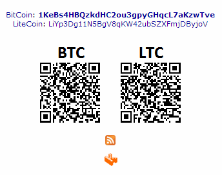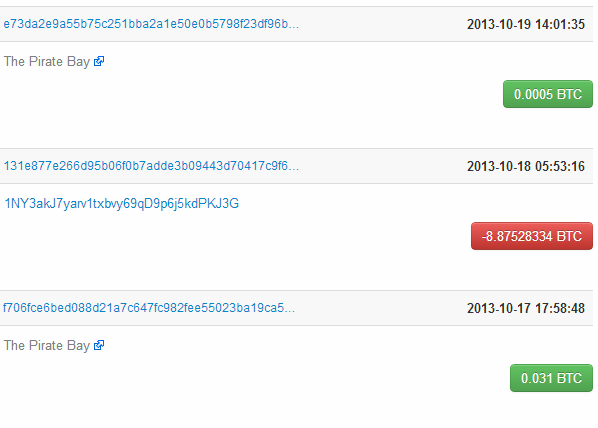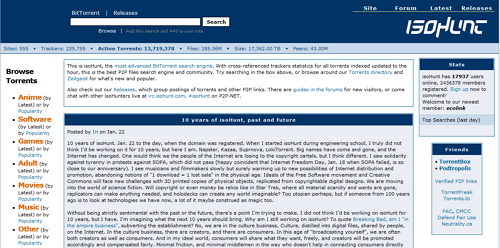RIAA: Bitcoin Makes it Hard to Track or Seize Pirate Bay Donations
mercredi 30 octobre 2013 à 18:33 This week the RIAA submitted a new list of “notorious websites” to the U.S. Government, sites that the labels would like to see disappear.
This week the RIAA submitted a new list of “notorious websites” to the U.S. Government, sites that the labels would like to see disappear.
The Pirate Bay also made it onto the list and the RIAA points out that despite the criminal convictions of its founders, the site continues to operate. The identities of the current administrators of the site remain a mystery to the music industry group.
“The true operators of the site remain unknown,” the RIAA writes. “The convicted individuals claimed the site is owned by a company based in the Seychelles, although no evidence has been provided.”
Interestingly, the RIAA also brings up the fact that The Pirate Bay is now accepting donations through the cryptocurrencies Bitcoin and Litecoin. This apparently complicates law enforcement efforts to track and seize funds of the torrent site.
“In April 2013, the site started accepting donations from the public by Bitcoin, a digital currency, which operates using peer-to-peer technology,” RIAA notes.
“There are no central authority or banks involved which makes it very difficult to seize or trace Bitcoin funds. In May 2013, the site also started accepting Litecoin, another peer-to-peer based internet currency.”
Bitcoin does indeed make it harder to seize funds, as law enforcement would need access to the computer where the wallet is kept. However, tracing where the Pirate Bay donations go isn’t all that hard. In fact, all transactions are visible to the public and we can today reveal where some of the Pirate Bay donations went.
In total, TPB has raised close to 100 Bitcoins spread over two addresses, which is roughly $20,000 at the current exchange rate. A quick look at the current wallet shows that The Pirate Bay received 64 Bitcoins which were all spent elsewhere.
As can be seen below, most recently 8.97 Bitcoins were spent on a fundraiser for a public audit of the open source encryption software TrueCrypt. Before that, part of the donations were spent on a charity rally from Dover to Mongolia. Of course, Bitcoin addresses can also be used anonymously so it’s not always possible to identify or trace the recipients.
Pirate Bay spends Bitcoin

TorrentFreak talked to The Pirate Bay team who told us that they don’t manage the Bitcoin donations themselves. They are grouped into one fund with donations to other projects, such as the PublicBitTorrent tracker, and end up in a central fund that’s managed by someone from the Pirate Party.
Considering the above, RIAA’s comments regarding the Bitcoin donations make it look much more suspicious than reality shows. But perhaps that’s exactly what the labels want to achieve?
Source: RIAA: Bitcoin Makes it Hard to Track or Seize Pirate Bay Donations
 During the past 15 years or so, online file-sharing has transformed from a relatively niche hobby into a mainstream activity. As Internet speeds and file availability have increased, most Internet users have contributed to the growth of the sharing phenomenon over the past decade.
During the past 15 years or so, online file-sharing has transformed from a relatively niche hobby into a mainstream activity. As Internet speeds and file availability have increased, most Internet users have contributed to the growth of the sharing phenomenon over the past decade. Interestingly, when conducting a review of the Top 10 Torrent Sites 2013 as published earlier
Interestingly, when conducting a review of the Top 10 Torrent Sites 2013 as published earlier  Earlier this month some pretty surprising news hit the file-sharing scene. After many years battling aggressively with the MPAA, Canadian BitTorrent site isoHunt suddenly agreed to
Earlier this month some pretty surprising news hit the file-sharing scene. After many years battling aggressively with the MPAA, Canadian BitTorrent site isoHunt suddenly agreed to 
 Earlier this year Pirate Bay founder Gottfrid Svartholm was found guilty of hacking into IT company Logica and handed a 24 month sentence.
Earlier this year Pirate Bay founder Gottfrid Svartholm was found guilty of hacking into IT company Logica and handed a 24 month sentence.